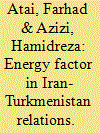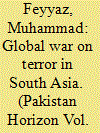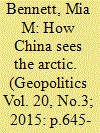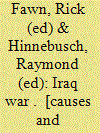|
|
|
Sort Order |
|
|
|
Items / Page
|
|
|
|
|
|
|
| Srl | Item |
| 1 |
ID:
187726


|
|
|
| 2 |
ID:
116318


|
|
|
|
|
| Publication |
2012.
|
| Summary/Abstract |
The collapse of the Soviet Union brought about major upheavals in Central Asia and the Caucasus. Among the newly independent states, those that were endowed with energy resources set out on the path of economic growth. The energy resources in Central Asia also attracted outside powers to the region. Moreover, the status of these countries as landlocked, and Russia's monopoly over energy pipelines, led these countries to search for new partners in order to reduce their dependency. This added a new dimension to the political, economic and security equations of the region. In this article, Turkmenistan is studied as a former Soviet republic and Iran as a regional actor that has interests in the region's energy dynamics. The role of energy in the relations between Turkmenistan and Iran is examined. The article proposes that the energy factor has produced a favorable atmosphere for closer relations between the two countries. However, Tehran needs to overcome a number of challenges in expansion of its relations with Turkmenistan, the most important of which is the United States' effective opposition to any Iranian initiative in the field of energy in the region.
|
|
|
|
|
|
|
|
|
|
|
|
|
|
|
|
| 3 |
ID:
092192


|
|
|
|
|
| Publication |
2009.
|
| Summary/Abstract |
On 20 September 2001, during a televised address to a joint session of Congress, President George W. Bush launched his war on terror, also referred to as the Global War on Terror, Global War on Terrorism.
|
|
|
|
|
|
|
|
|
|
|
|
|
|
|
|
| 4 |
ID:
140895


|
|
|
|
|
| Summary/Abstract |
In May 2013, China gained observer status in the Arctic Council, exemplifying its growing legitimacy as a regional actor in the eyes of the eight countries with territory north of the Arctic Circle. Yet since China remains an extraregional state without territory in the Arctic, Chinese officials continue to bolster their state’s legitimacy as an Arctic stakeholder through two spatially inconsistent but mutually reinforcing grand regional narratives. On the one hand, Chinese officials recognize the salience of territory and presence in the Arctic, underscoring their country’s “near-Arctic” location and polar scientific expeditions. On the other hand, officials depict the Arctic as a maritime, global space where climate change has potential ramifications for the entire planet. Significantly, these reframings are affecting intraregional states’ perceptions of the Arctic, demonstrating how a region’s territorial extent, symbolic meaning, and institutional form emerge through the ongoing conversation between extraregional and intraregional narratives.
|
|
|
|
|
|
|
|
|
|
|
|
|
|
|
|
| 5 |
ID:
074565


|
|
|
|
|
| Publication |
New Delhi, Viva Books Private Limited, 2007.
|
| Description |
ix, 357p.hbk
|
| Standard Number |
8130904276
|
|
|
|
|
|
|
|
|
|
|
|
Copies: C:1/I:0,R:0,Q:0
Circulation
| Accession# | Call# | Current Location | Status | Policy | Location |
| 051851 | 956.70443/FAW 051851 | Main | On Shelf | General | |
|
|
|
|
| 6 |
ID:
132875


|
|
|
|
|
| Publication |
2014.
|
| Summary/Abstract |
This article reflects on application of the concept of strategic culture to supply analytical and policy-relevant guidance to those who ponder the future of security relations in the Asia-Pacific. Argued here is that, notwithstanding some obvious problems with the concept, there is utility in the application of strategic culture to the analysis of regional security challenges. To claim that strategic culture may not be equally applicable to all states in the Asia-Pacific region is not the same as saying it has no applicability at all, especially if the states to which it is applicable are important regional actors. This article suggests that both an old approach derivative of national character, and a new one associated with path dependence, might together prove fruitful for policy analysts and policy-makers alike, as they wrestle with what many assume to be the fundamental question of the coming half-century in the Asia-Pacific, namely whether a great power war in the region can be averted. Although there is much variation in the manner with which authors apply the master concept of strategic culture to their specific Asia-Pacific cases, each takes seriously the utility of a cultural approach to national strategic choice. So while the quest for reliable causality and predictive capability on a region-wide basis may remain that of the will-o'-the-wisp, there can be no gainsaying that, on a case-by-case basis, the authors show that the approach can demonstrate valuable insights into the policy dilemmas of cultural provenance and content confronting the Asia-Pacific.
|
|
|
|
|
|
|
|
|
|
|
|
|
|
|
|
|
|
|
|
|